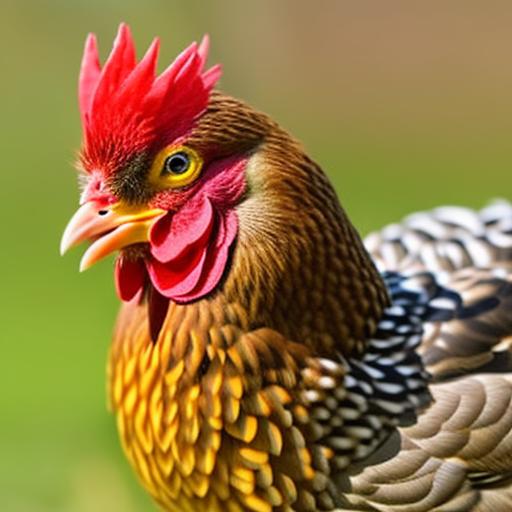When adding new chickens to your flock, it is important to separate them from the rest of the chickens for a period of time. This separation is crucial for the health and safety of both the new chickens and the existing flock. By keeping the new chickens separate, you can prevent the spread of diseases, reduce stress, and ensure a smooth integration process. In this article, we will discuss the reasons for separating new chickens, how long to keep them separate, factors to consider when deciding the duration, preparing the chicken coop for new chickens, setting up a temporary brooder, introducing new chickens to the flock, monitoring their health during the separation period, signs that indicate they are ready to join the flock, and the importance of patience and care throughout the process.
Key Takeaways
- Separating new chickens is important to prevent disease and aggression
- New chickens should be kept separate for at least 2-4 weeks
- Factors to consider when deciding how long to keep new chickens separate include age, breed, and health status
- Preparing the chicken coop and setting up a temporary brooder are important steps in introducing new chickens
- Monitoring the health of new chickens and looking for signs of readiness to join the flock is crucial for a successful integration
Reasons for Separating New Chickens
Separating new chickens from the rest of the flock is important for several reasons. Firstly, it helps prevent the spread of diseases. New chickens may carry diseases or parasites that can be transmitted to the existing flock. By keeping them separate initially, you can observe them for any signs of illness and prevent the spread of any potential diseases.
Secondly, separating new chickens reduces stress. When new chickens are introduced to an established flock, there is often a pecking order established. This can lead to bullying and aggression towards the new birds. By keeping them separate initially, you give them time to adjust to their new environment without being subjected to any aggression from the existing flock.
How Long Should You Keep New Chickens Separate?
The recommended length of time to keep new chickens separate from the rest of the flock is typically 2-4 weeks. This gives them enough time to acclimate to their new surroundings and allows you to monitor their health before introducing them to the existing flock.
Factors to Consider When Deciding How Long to Keep New Chickens Separate
There are several factors that can affect how long you should keep new chickens separate. One factor to consider is the age of the new chickens. Younger chickens may need more time to adjust and grow before being introduced to the rest of the flock. Additionally, the health of the new chickens should be taken into consideration. If they are showing any signs of illness or weakness, it may be best to keep them separate for a longer period of time to ensure they fully recover before being exposed to the existing flock.
The temperament of the new chickens is another important factor to consider. If they are particularly timid or shy, they may need more time to build up their confidence before being introduced to the rest of the flock. On the other hand, if they are displaying confident behavior and showing interest in the other chickens, it may be a sign that they are ready to join the flock sooner.
Preparing the Chicken Coop for New Chickens
Before bringing new chickens into your flock, it is important to prepare the chicken coop for their arrival. This includes cleaning and disinfecting the area to prevent the spread of any potential diseases. Remove any old bedding and clean all surfaces with a poultry-safe disinfectant. Make sure there is enough space for the new chickens to move around comfortably and provide adequate resources such as food and water stations.
Setting Up a Temporary Brooder for New Chicks

If you are adding young chicks to your flock, it is necessary to set up a temporary brooder for them until they are old enough to join the rest of the flock. A brooder provides a warm and safe environment for the chicks to grow and develop. It should be equipped with a heat source, such as a heat lamp or heating pad, bedding material, food and water containers, and enough space for the chicks to move around.
Introducing New Chickens to the Flock
When it comes time to introduce the new chickens to the rest of the flock, it is important to do so gradually and under supervised conditions. Start by placing the new chickens in a separate enclosure within the chicken coop, allowing them to see and interact with the existing flock without direct contact. This allows them to become familiar with each other’s presence without the risk of aggression or bullying.
After a few days of supervised interactions, you can begin to allow the new chickens to mingle with the rest of the flock. Keep a close eye on their behavior and intervene if any aggression occurs. It may take some time for the pecking order to be established, but with patience and careful monitoring, the new chickens should eventually integrate into the flock.
Monitoring the Health of New Chickens During the Separation Period
During the separation period, it is important to monitor the health of the new chickens closely. Check for any signs of illness, such as lethargy, loss of appetite, or abnormal droppings. Provide them with proper nutrition and care to ensure they stay healthy and strong. If any signs of illness are observed, it may be necessary to extend their separation period until they fully recover.
Signs That Indicate New Chickens are Ready to Join the Flock
There are several signs that indicate new chickens are ready to join the rest of the flock. One sign is when they start showing interest in the other chickens and actively seek out their company. They may also display confident behavior, such as exploring their surroundings and interacting with the existing flock without fear or hesitation. These signs indicate that they have adjusted well to their new environment and are ready for integration.
The Importance of Patience and Care When Integrating New Chickens into Your Flock
In conclusion, separating new chickens from the rest of the flock is crucial for their health and safety. By preventing the spread of diseases and reducing stress, you can ensure a smooth integration process. It is important to keep new chickens separate for a recommended period of 2-4 weeks, taking into consideration factors such as age, health, and temperament. By preparing the chicken coop and setting up a temporary brooder, you can provide a suitable environment for the new chickens. When introducing them to the rest of the flock, do so gradually and under supervised conditions. Monitor their health closely during the separation period and look for signs that indicate they are ready to join the flock. Above all, be patient and prioritize the health and safety of your chickens throughout the integration process.
If you’re new to raising chickens, you may be wondering how long to keep new chickens separate before introducing them to the rest of your flock. It’s an important consideration to ensure the health and safety of your birds. In a recent article on Poultry Wizard, they discuss this topic in detail and provide valuable insights on the subject. From tips on introducing new chickens to the floor of the chicken coop (link: https://poultrywizard.com/keeping-chickens/floor-of-chicken-coop/) to building an A-frame chicken coop (link: https://poultrywizard.com/keeping-chickens/a-frame-chicken-coop/) and chicken coop run plans (link: https://poultrywizard.com/keeping-chickens/chicken-coop-run-plans/), Poultry Wizard offers a wealth of information for both novice and experienced chicken keepers.
FAQs
What is the reason for keeping new chickens separate?
Keeping new chickens separate is important to prevent the spread of diseases and to allow the new chickens to adjust to their new environment.
How long should new chickens be kept separate?
New chickens should be kept separate for at least two weeks to ensure they are healthy and to prevent the spread of any diseases they may have brought with them.
What should be done during the separation period?
During the separation period, new chickens should be kept in a separate coop or area away from the existing flock. They should be monitored for any signs of illness and given proper nutrition and care.
What signs should I look for to determine if new chickens are healthy?
Healthy chickens should have bright eyes, clean feathers, and be active and alert. They should also have a healthy appetite and be drinking water regularly.
Can new chickens be introduced to the existing flock after the separation period?
Yes, new chickens can be introduced to the existing flock after the separation period. However, it is important to introduce them slowly and carefully to prevent any aggression or fighting among the chickens.
Meet Walter, the feathered-friend fanatic of Florida! Nestled in the sunshine state, Walter struts through life with his feathered companions, clucking his way to happiness. With a coop that’s fancier than a five-star hotel, he’s the Don Juan of the chicken world. When he’s not teaching his hens to do the cha-cha, you’ll find him in a heated debate with his prized rooster, Sir Clucks-a-Lot. Walter’s poultry passion is no yolk; he’s the sunny-side-up guy you never knew you needed in your flock of friends!







